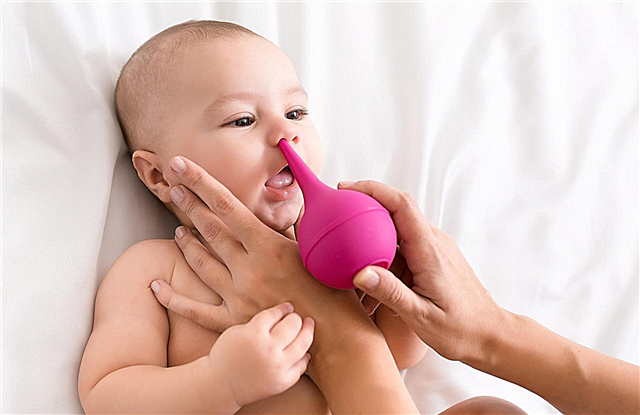
When a child starts bleeding, it always scares the parents. But, if many people encounter bleeding from the nose and it is quite simple to help a baby with nosebleeds, then blood from the ear goes much less often, therefore, in such a situation, the mother often does not know what to do and what is the reason for such bleeding.

What is it
Bleeding from the ear often manifests itself in the form of droplets or trickles of blood from the auricle or ear canal. In many cases, it occurs after some external influence, for example, the child fell and hit his head, or they cleaned the ear, and blood began to flow. However, a mother can detect bleeding by accident, noticing only its consequences, for example, when cleaning, dried blood will be found in the ear. In addition, blood from the ear can be excreted with an admixture of pus or serous fluid.

Causes
In childhood, ear problems are often limited to inflammation associated with the anatomical features of the middle ear and Eustachian tubes, as well as with frequent viral diseases and colds. If blood is released from the child's ear, there are several explanations for this situation.

There was a mechanical injury to the ear
It could have been provoked by a traumatic brain injury (skull fracture, labyrinth contusion), but a more common cause is damage to the ears by foreign objects, for example, a child stuck a cotton swab in his ear and bleeds. As a rule, in such a situation a bleeding scratch of the ear canal occurs. In addition, wanting to get rid of discomfort in the ears, babies can put various objects into the sink, including sharp ones (toothpicks, paper clips, matches, sticks, toys, etc.), which also often ends in bleeding.
Also, the ear can be injured while playing, for example, when hitting a ball. Such an injury can lead to the appearance of a hematoma under the cartilage of the shell. In addition, a strong blow can provoke a ruptured eardrum. In this case, the child will have bleeding, severe pain and hearing impairment. The membrane can also rupture if the ear falls into water or when an adult tries to pull a foreign object out of the child's ear.

Bleeding has an infectious cause
Blood can be secreted with otitis media, accompanied by symptoms of middle ear inflammation such as high body temperature, severe pain, weakness, dizziness. It is especially dangerous if in a child with such an inflammation only blood is released from the ear, and there are no impurities of pus. This is a sign of the deepening of the infectious process.
Another common cause of blood from the ear is a boil. A child with such inflammation will have redness and swelling of the ear, and the temperature may rise. When the furuncle in the ear is opened, then after the discharge of pus, blood appears.
We recommend watching the release of Dr. Komarovsky's program, dedicated to such a disease in children as otitis media:
Also bleeding from the ear can be provoked infectious inflammation of the tympanic membrane (it's called myringitis). A child with such a pathology will complain of severe pain and severe discomfort in the ear. In addition, with myringitis, the temperature often rises. With this infection, a bubble filled with serous fluid forms in the ear. When it is opened, the child's discomfort decreases, and exudate with blood appears from the ear.
Another infectious cause of ear bleeding is candidiasis... Such an infection occurs when the defenses of the child's body are weakened. If it gets into the ear, it can manifest itself with a fairly heavy bleeding.

The child has tumor formations
The swelling in the ear that causes bleeding is benign. For example, it can be a glomus tumor that appears on a vein. When it grows, the child begins to complain of dizziness and noise in the ear. A symptom of this formation is abundant blood flow.
Another benign cause of ear growths that can bleed is polyps... The doctor will easily notice such formations in the child's ear canal, and sometimes the polyps grow so much that they go beyond the ear canal. In addition to bleeding, this pathology can manifest itself as dizziness, headaches and hearing loss.
Ear cancers are most often carcinoma, which can affect both the outer and middle ears. Blood from the auricle or ear canal is often the first symptom of such a tumor.

What to do
Having found bleeding from the ear in a child, in most cases, you should immediately show the baby to an otorhinolaryngologist. If the cause of bleeding is a serious illness that requires urgent treatment, delay in visiting a doctor can cause complications, including hearing loss. The only case when you can not rush to the ENT, but let the bleeding stop itself, is a small mechanical injury to the skin on the auricle, for example, a scratch.
How to provide first aid
If the auricle is damaged
Rinse out any debris from the sink using warm water and a sterile bandage. Next, the wound on the sink should be lubricated with iodine (alcohol solution) and covered with a bandage, after which the child should be taken to an emergency room or other medical institution.
If blood appears after cleaning
Moisten a cotton or gauze swab with peroxide solution, wipe the child's ear, apply a bandage to the auricle, and then consult an otorhinolaryngologist. You should not give your child any medication or put the ear in until a doctor has seen it.

With a ruptured tympanic membrane
Make a swab out of sterile cotton wool and insert into the child's ear canal. Cover the top with a bandage and get the baby to the hospital as soon as possible.
With a foreign body
Do not try to remove the object yourself, especially with sharp objects, as there is a risk of pushing the foreign body deeper. It is best to contact the ENT immediately.
With traumatic brain injury
Lay the child on a flat surface and call an ambulance. Do not touch or rinse your ear.
Treatment
The doctor's tactics will depend on the cause of the bleeding from the ear:
- With purulent otitis media or boils, the child will be prescribed an antibiotic, anesthetic and other medications. Also, the doctor will tell you how to rinse the ear and what drops can be instilled.
- With candidiasis, the baby will be prescribed antifungal treatment.
- For scratches or abrasions, treatment will include treating the ear with an antiseptic.
- If a child has a ruptured eardrum, the size of the perforation will determine the doctor's actions. Sometimes surgery is needed.
- If a foreign body is in the ear, the doctor will remove the object and, if necessary, prescribe additional treatment.
- If a neoplasm is detected, the child will be referred to an oncologist and prescribed special therapy.




